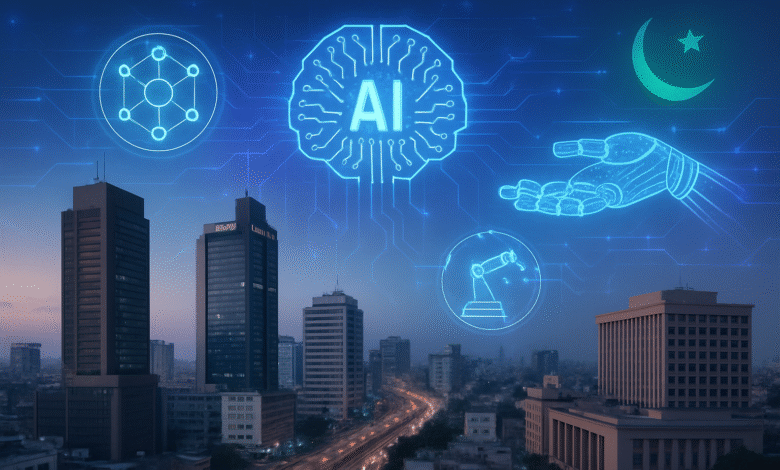Proven AI Strategies Transforming Karachi’s Business Landscape
Discover proven AI strategies transforming Karachi businesses. Learn implementation tips, case studies & future trends for competitive advantage.

Pakistan’s largest city and economic hub, Karachi, is experiencing a remarkable transformation as businesses embrace artificial intelligence to stay competitive in the global market.
The AI strategies transforming Karachi’s business environment are creating new opportunities, improving efficiency, and helping local companies compete with international players.
From small startups to large corporations, businesses across the city are discovering how smart technology can revolutionize their operations.
The Current State of AI Adoption in Karachi
Karachi’s business community has shown impressive enthusiasm for artificial intelligence adoption. The city, which generates over 20% of Pakistan’s GDP, is home to numerous tech companies, financial institutions, and manufacturing businesses that are leading the AI revolution in the region.
Local businesses are implementing various artificial intelligence solutions to solve everyday challenges. These range from simple chatbots for customer service to complex machine learning systems for supply chain management. The growing tech infrastructure and increasing internet penetration have made it easier for companies to access and implement AI tools.
The textile industry, which forms the backbone of Karachi’s economy, has been particularly active in adopting AI for quality control and production optimization. Meanwhile, the banking sector is using artificial intelligence for fraud detection and customer service automation.
Key AI Technologies Reshaping Karachi Businesses
Machine Learning Applications
Machine learning has become one of the most popular AI technologies among Karachi businesses. Companies are using it to analyze customer behavior, predict market trends, and optimize their operations. Retail businesses use machine learning algorithms to understand shopping patterns and manage inventory more effectively.
Manufacturing companies in Karachi’s industrial areas are implementing predictive maintenance systems powered by machine learning. These systems help prevent equipment failures, reduce downtime, and save significant costs. The technology analyzes data from sensors and historical records to predict when machines might need maintenance.
Natural Language Processing Solutions
Natural language processing (NLP) is helping Karachi businesses break down language barriers and improve customer communication. Many companies are developing multilingual chatbots that can communicate in Urdu, English, and other local languages.
Customer service departments across various industries are using NLP-powered systems to handle routine inquiries automatically. This allows human agents to focus on more complex issues while ensuring customers receive quick responses to common questions.
Computer Vision Technology
Computer vision applications are transforming quality control processes in Karachi’s manufacturing sector. Textile companies use image recognition systems to detect defects in fabrics, while food processing businesses employ computer vision for quality assurance.
Security companies in Karachi are also leveraging computer vision for surveillance systems. These smart security solutions can identify suspicious activities and alert security personnel in real-time, making businesses and commercial areas safer.
Industry-Specific AI Implementation Strategies
Banking and Financial Services
Karachi’s banking sector has been at the forefront of AI adoption in Pakistan. Major banks are using artificial intelligence for credit scoring, helping them make better lending decisions while reducing risk. AI-powered systems analyze thousands of data points to assess loan applications more accurately than traditional methods.
Fraud detection systems powered by machine learning have become essential tools for financial institutions. These systems can identify unusual transaction patterns and flag potentially fraudulent activities within seconds, protecting both banks and customers from financial losses.
Digital banking services are becoming more personalized through AI recommendations. Banks use customer data to suggest relevant financial products and services, improving customer satisfaction and increasing revenue.
Retail and E-commerce
Online retailers in Karachi are using AI strategies to enhance customer experience and boost sales. Recommendation engines analyze customer browsing history and purchase patterns to suggest products that customers are most likely to buy.
Inventory management has become more efficient through AI-powered demand forecasting. Retailers can predict which products will be popular during specific seasons or events, helping them stock appropriately and reduce waste.
Price optimization algorithms help retailers set competitive prices while maintaining healthy profit margins. These systems consider factors like competitor pricing, demand patterns, and market conditions to recommend optimal pricing strategies.
Manufacturing and Textiles
Karachi’s manufacturing sector is experiencing significant improvements through AI implementation. Smart factories use artificial intelligence to optimize production schedules, reduce energy consumption, and minimize waste.
Quality control processes have become more accurate and efficient with AI-powered inspection systems. These technologies can detect defects that human inspectors might miss, ensuring higher product quality and customer satisfaction.
Supply chain optimization through AI helps manufacturers coordinate with suppliers and distributors more effectively. Predictive analytics help companies anticipate supply chain disruptions and take preventive measures.
Healthcare and Medical Services
Healthcare providers in Karachi are gradually adopting AI technologies to improve patient care and operational efficiency. Medical imaging systems powered by artificial intelligence help doctors diagnose conditions more accurately and quickly.
Hospital management systems use AI to optimize staff scheduling, bed allocation, and resource management. These improvements lead to better patient experiences and more efficient healthcare delivery.
Telemedicine platforms enhanced with AI capabilities are making healthcare more accessible to people in remote areas around Karachi. These systems can provide preliminary diagnoses and health recommendations, reducing the burden on healthcare facilities.
Also Read: AI in Clinical Practice: Revolutionizing Healthcare at 26th NHSRS
Successful AI Implementation Case Studies
Local Bank Transforms Customer Service
One of Karachi’s leading banks implemented an AI-powered customer service system that reduced wait times by 60% and improved customer satisfaction scores significantly. The system handles routine inquiries automatically while escalating complex issues to human agents.
The bank’s AI chatbot can process loan applications, provide account information, and even offer financial advice. This 24/7 availability has made banking services more accessible to customers across different time zones and work schedules.
Textile Company Improves Quality Control
A major textile manufacturer in Karachi’s industrial area implemented computer vision technology for fabric inspection. The AI system can identify defects with 95% accuracy, compared to 70% accuracy achieved through manual inspection.
This improvement in quality control has reduced customer complaints by 40% and increased the company’s reputation in international markets. The automated system also works faster than human inspectors, increasing overall production efficiency.
E-commerce Platform Boosts Sales
A local e-commerce company used AI recommendation engines to personalize customer experiences. The implementation resulted in a 35% increase in average order value and improved customer retention rates.
The platform’s AI system analyzes customer behavior in real-time to display relevant products and offers. This personalized approach has helped the company compete effectively with international e-commerce giants.
Overcoming AI Implementation Challenges
Addressing the Skills Gap
One of the biggest challenges facing businesses in Karachi is the shortage of AI-skilled professionals. Companies are addressing this by partnering with local universities to develop training programs and hiring fresh graduates with potential.
Many businesses are investing in employee training to upskill their existing workforce. Online courses, workshops, and certification programs are helping employees learn AI-related skills without requiring advanced technical backgrounds.
Managing Implementation Costs
The initial cost of AI implementation can be significant for small and medium businesses. However, companies are finding creative solutions, such as starting with simple AI tools and gradually expanding their capabilities.
Cloud-based AI services have made advanced technologies more affordable for businesses of all sizes. These pay-as-you-use models allow companies to access powerful AI capabilities without large upfront investments.
Ensuring Data Security
Data protection has become a crucial concern as businesses collect and analyze more customer information. Companies are implementing robust security measures and following international data protection standards to maintain customer trust.
Regular security audits and employee training on data handling practices help businesses minimize risks associated with AI implementation. Partnering with reputable technology providers also ensures better security standards.
Future Trends and Opportunities
Emerging AI Technologies
Several emerging AI technologies show promise for Karachi businesses. Autonomous systems could revolutionize logistics and delivery services in the busy city. Smart city initiatives could improve traffic management and urban planning.
Voice recognition technology is becoming more sophisticated and could transform how businesses interact with customers. Internet of Things (IoT) devices combined with AI could create smarter offices and manufacturing facilities.
Government Support and Initiatives
The Pakistani government is showing increased support for AI adoption through various initiatives and policies. Digital Pakistan Vision includes specific goals for artificial intelligence development and implementation across different sectors.
Tax incentives and grants for technology adoption are encouraging more businesses to invest in AI solutions. The establishment of technology parks and incubation centers is creating a supportive environment for AI startups and innovation.
International Partnerships
Karachi businesses are forming partnerships with international technology companies to access advanced AI solutions and expertise. These collaborations bring global best practices to local businesses and help them compete in international markets.
Foreign investment in Pakistan’s technology sector is increasing, bringing additional resources and knowledge for AI development. These partnerships also create opportunities for local professionals to gain experience with cutting-edge technologies.
Practical Steps for AI Implementation
Assessment and Planning
Businesses should start their AI journey by identifying specific problems that artificial intelligence can solve. A thorough assessment of current processes and pain points helps prioritize AI implementation areas.
Setting realistic goals and timelines is crucial for successful AI adoption. Companies should start with pilot projects to test AI solutions before full-scale implementation.
Choosing the Right AI Solutions
Not all AI technologies are suitable for every business. Companies need to evaluate different options based on their specific needs, budget, and technical capabilities.
Working with experienced AI consultants or technology partners can help businesses make informed decisions about which solutions to implement first.
Training and Change Management
Employee training is essential for successful AI implementation. Staff members need to understand how AI tools work and how they can benefit from using these technologies.
Change management strategies help employees adapt to new AI-powered processes. Clear communication about the benefits of AI and addressing concerns about job security are important for smooth transitions.
Measuring AI Success and ROI
Key Performance Indicators
Businesses need to establish clear metrics to measure the success of their AI implementations. Common KPIs include cost savings, efficiency improvements, customer satisfaction scores, and revenue growth.
Regular monitoring and analysis of these metrics help businesses understand the impact of their AI investments and make necessary adjustments to improve performance.
Long-term Benefits
While initial AI implementation may require significant investment, the long-term benefits often justify the costs. Improved efficiency, better decision-making, and competitive advantages contribute to sustained business growth.
Companies that successfully implement AI strategies often see improvements in employee productivity, customer satisfaction, and overall business performance that continue to grow over time.
Building an AI-Ready Business Culture
Leadership Commitment
Successful AI transformation requires strong leadership commitment and vision. Business leaders need to champion AI initiatives and provide necessary resources for implementation.
Creating a culture that embraces innovation and continuous learning helps businesses adapt to rapidly evolving AI technologies.
Employee Engagement
Involving employees in AI planning and implementation processes increases acceptance and success rates. Regular communication about AI benefits and providing training opportunities helps build enthusiasm for new technologies.
Recognizing and rewarding employees who contribute to AI success creates positive reinforcement for continued innovation and adoption.
Conclusion
The AI strategies transforming Karachi’s business landscape represent a significant opportunity for companies to improve their operations, serve customers better, and compete in global markets. From banking and retail to manufacturing and healthcare, artificial intelligence is creating positive changes across all sectors.
Success in AI implementation requires careful planning, appropriate investment in training and technology, and a commitment to continuous improvement. Businesses that embrace these strategies position themselves for sustained growth and success in an increasingly digital world.
As Karachi continues to evolve as a major business hub, companies that effectively leverage artificial intelligence will lead the transformation and set new standards for innovation and efficiency. The future belongs to businesses that can successfully integrate AI technologies while maintaining their focus on customer value and operational excellence.
The journey toward AI transformation may seem challenging, but the rewards – improved efficiency, better customer service, and competitive advantages – make it a worthwhile investment for forward-thinking businesses in Karachi’s dynamic marketplace.











